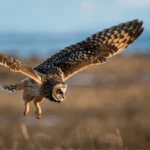Contacto de prensa: Jordan Rutter, Director de Relaciones Públicas | jerutter@abcbirds.org | @JERutter

Short-eared Owl. Photo by Ghost Bear/Shutterstock
(Washington, D.C., January 25, 2022) In mid-January, New York State’s new Office of Renewable Energy Siting (ORES) approved Heritage Wind – the first wind energy facility considered under the state’s new renewable energy project review process.
Members of the conservation community, including American Bird Conservancy (ABC), Genesee Valley Audubon Society, and Rochester Birding Association, have long expressed grave concerns about the Heritage Wind project. While some of these concerns remain, ABC believes that ORES rendered a thoughtful decision that reasonably balances renewable energy development with the need to protect the state’s declining bird populations.
Apex Clean Energy, the developer for Heritage Wind, proposed to place wind turbines adjacent to a wetland and forest complex of enormous ecological importance. This block of habitat includes Iroquois National Wildlife Refuge and Oak Orchard and Tonawanda Wildlife Management Areas. This area hosts state-listed birds like the Búho campestre, Black Tern, and Sedge Wren, as well as nesting Bald Eagles. Surrounded by agriculture, the targeted area is an oasis for migratory birds in spring and fall. Its significance is recognized by National Audubon Society, which designated it an Important Bird Area.
Proposing turbines next to this top-priority conservation area was particularly dangerous for migratory songbirds, which make their spectacular spring and fall flights primarily at night. Countless birds stop there to rest and refuel during their arduous annual journeys. Indeed, the U.S. Fish and Wildlife Service conducted a radar study that found that migratory birds move through this area in huge numbers.
Of greatest concern to conservationists was the subset of proposed turbines closest to the important bird habitat. Conservation groups, the Servicio de Pesca y Vida Silvestre de los Estados Unidos, y el State Department of Environmental Conservation (DEC) had separately flagged six specific turbines as needing to be relocated or removed from the plan.
“Apex didn’t make it easy for ORES,” says Joel Merriman, American Bird Conservancy’s Bird-Smart Wind Energy Campaign Director. “They hired a host of lawyers and consultants to make an extensive and too often misleading case that did not adhere to best practices, nor the best available science. ORES had a difficult task in wading through this, with not much time to do it. ORES did an admirable job in separating the facts from the spin.”
ORES agreed with the independent experts at the agencies and conservation groups, indicating that the six highest-risk turbines should be relocated or removed from the plan. If Apex can prove that this is “impracticable,” they would instead be required to provide enhanced measures to minimize impacts to birds, including a study to quantify migratory bird use and a plan to halt turbine blades at times of elevated collision risk.
“It was a well-reasoned decision,” Merriman says. “ORES agreed with independent experts that six specific turbines posed an unacceptably high risk to birds, and that they should not be installed near important bird habitat. But they also gave Apex the chance to prove their unsubstantiated claims that removing those turbines from the plan would have dire consequences for the project, as they claimed a number of times during the review process. ORES’s decision allows the project to go forward,” adds Merriman, “but with reasonable, science-based measures to minimize environmental impacts.”
This is not the first time that Apex has drawn the ire of the conservation community in New York. The company caused a stir when it failed to disclose the presence of an active Bald Eagle nest at a proposed project site on Galloo Island. This paled in comparison to the backlash over the Lighthouse Wind project, which would place turbines near the south shore of Lake Ontario, in an area known to be used by large numbers of migratory hawks, eagles, and other birds.
“It is our hope that Apex takes their win, removes or relocates the highest-risk turbines, and leaves it at that,” says Merriman. “This is yet another unfortunate example of their tendency to push the envelope too far on environmental impacts. We know that bird populations are declining – it’s vital that we take a thoughtful and balanced approach to siting wind turbines.”
ABC thanks the Leon Levy Foundation for its support of ABC’s Bird-Smart Wind Energy Campaign.
###
Conservación de Aves de Estados Unidos es una organización sin fines de lucro dedicada a la conservación de las aves silvestres y sus hábitats en todo el continente americano. Con énfasis en la obtención de resultados y el trabajo en colaboración, abordamos los mayores problemas que enfrentan las aves en la actualidad, innovando y aprovechando los rápidos avances científicos para detener las extinciones, proteger los hábitats, eliminar las amenazas y fortalecer la capacidad para la conservación de las aves. Visítenos en abcbirds.org., Facebook, Instagram, y Gorjeo (@ABCbirds).